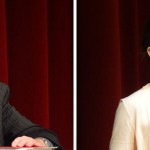When the Elite’s Political Equation Breaks Down
Donald Devine makes some interesting points about Donald Trump and political science, following Aaron Wildavsky in his theory about “four fundamental political types”: egalitarians, individualists, social conservatives, and fatalists. That last group, he says, don’t often vote, partly because they see the world as a chaotic mess, so what’s the point? They will vote, though, for an autocratic hero whom they believe will be able to grab the reins.
The key paragraph in Devine’s essay, though, is this one:
Pollster Frank Luntz came reeling out of one of his distinctive focus groups the other day crying “my legs are shaking” from seeing the depth of commitment of the Trump supporters he interviewed at the session. “I want to put the Republican leadership behind this mirror and let them see. They need to wake up. They don’t realize how the grassroots have abandoned them. Donald Trump is punishment to a Republican elite that wasn’t listening to their grassroots.” He even showed the audience unflattering images of and statements by Trump meant to turn them off. It did not work. At the end they were more committed than at the beginning.
I wonder if this is the fatal flaw of elite technocrats who think they’ve got everything all figured out and locked up. If so, it can apply to much more than just politics (such as the economic gear spinning of the Fed). At a certain level of analysis, people stop being people and become data points. Actions stop being taken because of their effect on people, and people’s responses to them, but because the formulas and the analysis suggest that they will bring advantage at a particular time.
Making a statement of a particular sort will produce a desirable reaction from group X and an undesirable reaction from group Y. At this political moment, the value of the positive reaction is (a) and the detriment of the negative reaction is (b), so if (a)X > (b)Y, you make the statement. Considerations such as the etiquette of the political system and the truth of the statement don’t get any more value than what the equation suggests that they should.
The problem is that people aren’t automatons; we have emotions as part of a nature that helps us learn and adapt, and we exist along a spectrum. At some point, when tossing aside the etiquette of the system and a culture that prioritizes truth, the elite reaches a point at which somebody who is even more shameless than they are steps in, and the folks along the spectrum who would normally be able to sniff out the falsehood have learned that truth can’t be expected, anyway.


